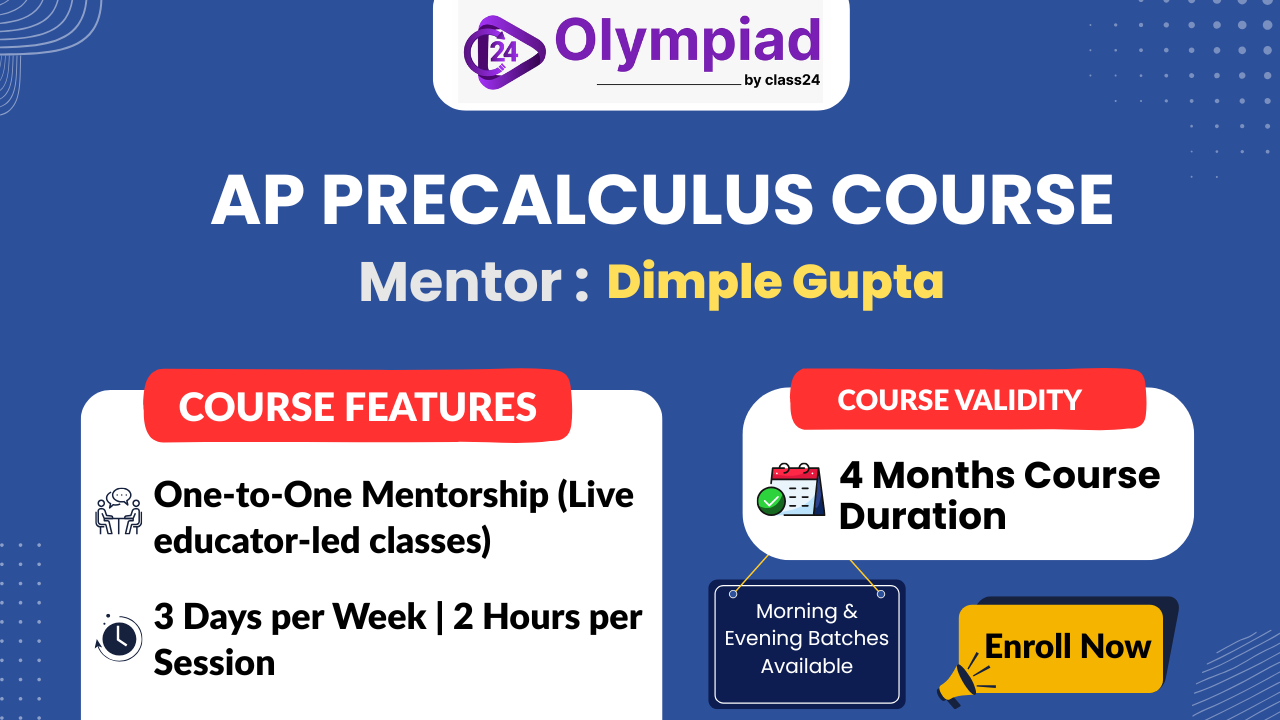AP Precalculus 2025: Master Functions, Trigonometry, and Advanced Mathematical Modeling
Prepare for college-level mathematics with our AP Precalculus course. Gain a deep understanding of polynomial, rational, exponential, logarithmic, trigonometric, and polar functions while developing hands-on problem-solving skills. With interactive lessons, calculator-based modeling, and exam-focused practice, this course equips students for success in calculus, STEM fields, and other advanced disciplines.
About the Course
AP Precalculus is a college-level mathematics course designed to prepare students for success in calculus and a broad range of STEM and non-STEM fields. The course develops deep conceptual understanding and procedural fluency in functions and mathematical modeling, making it especially useful for students planning to pursue science, engineering, data science, economics, health science, and social science disciplines.
Course Units:
The AP Precalculus course is structured into four units, with Units 1, 2, and 3 assessed on the AP Exam. Unit 4 content is not assessed on the AP Exam.
- Unit 1: Polynomial and Rational Functions (30–40% Exam Weighting)
- 1.1: Change in Polynomial Functions
- 1.2: Rates of Change
- 1.3: Polynomial Functions and Rates of Change
- 1.4: Polynomial Functions and Complex Zeros
- 1.5: Polynomial Functions and End Behavior
- 1.6: Rational Functions and Asymptotes
- 1.7: Rational Functions and Holes
- 1.8: Rational Functions and Equivalent Forms
- 1.9: Rational Functions and Variation
- 1.10: Transformations of Functions
- 1.11: Function Model Selection and Assumption
- 1.12: Function Model Construction and Application
- Unit 2: Exponential and Logarithmic Functions (27–40% Exam Weighting)
- 2.1: Change in Linear and Exponential Functions
- 2.2: Exponential Function Models
- 2.3: Exponential Function Transformations
- 2.4: Composing Functions
- 2.5: Inverses of Functions
- 2.6: Logarithmic Function Models
- 2.7: Logarithmic Function Transformations
- 2.8: Logarithmic Properties
- 2.9: Exponential and Logarithmic Equations
- 2.10: Logarithmic Function Scales and Modeling
- 2.11: Arcsin, Arccos, and Arctan
- Unit 3: Trigonometric and Polar Functions (30–35% Exam Weighting)
- 3.1: Periodic Phenomena
- 3.2: Sine, Cosine, and Tangent
- 3.3: Sine and Cosine Function Values
- 3.4: Sine and Cosine Function Graphs
- 3.5: Sinusoidal Function Transformations
- 3.6: Sinusoidal Function Models and Rates of Change
- 3.7: Sinusoidal Function Model Construction
- 3.8: Inverse Trigonometric Functions
- 3.9: Trigonometric Equations
- 3.10: The Secant, Cosecant, and Cotangent Functions
- 3.11: Equivalent Representations of Trigonometric Functions
- 3.12: Trigonometry and the Unit Circle
- 3.13: Polar Coordinates
- 3.14: Polar Functions
- 3.15: Rates of Change in Polar Functions
- Unit 4: Functions Involving Parameters, Vectors, and Matrices (Not assessed on the AP Exam)
- 4.1: Parametric Functions
- 4.2: Parametric Functions and Rates of Change
- 4.3: Parametric Functions and Graphs
- 4.4: Parametrically Defined Motion
- 4.5: Implicitly Defined Relations
- 4.6: Conic Sections
- 4.7: Representations of Implicitly Defined Relations
- 4.8: Vectors
- 4.9: Vector-Valued Functions
- 4.10: Matrices
- 4.11: The Inverse and Determinant of a Matrix
- 4.12: Linear Transformations of a Planar Region
- 4.13: Matrices as Functions
- 4.14: Matrices Modeling Motion
Professional Online Tutoring in Science & Math
Unlock your child’s true potential with expert-led, interactive online classes that make complex concepts simple, spark curiosity, and build lasting confidence in STEM subjects.
- Customized learning plans for every grade
- Live, engaging sessions with experienced educators
- Globally aligned curriculum for future-ready skills
Book a 1-on-1 Counseling Session

Benefits of AP Precalculus
- College readiness across disciplines: Prepares students not only for Calculus but also for other advanced math-related courses in biology, chemistry, economics, and more.
- Function-focused foundation: Develop a deep understanding of function behavior and applications in real-life modeling.
- Cross-representation mastery: Gain fluency in interpreting and expressing mathematical ideas graphically, numerically, analytically, and verbally.
- Technology integration: Use graphing calculators and digital tools to support exploration, analysis, and visualization.
- College credit opportunity: High scores may translate to college placement or credit, saving time and money in college.
Why Choose Us
We offer a robust and dynamic AP Precalculus learning experience that prepares students for the AP exam and beyond:
Expert Instruction
Learn from experienced teachers who specialize in AP mathematics and standardized exam strategies.
Comprehensive Content Coverage
All exam-relevant units are taught with clarity, depth, and real-world applications.
Practice-Driven Learning
Reinforce understanding with targeted drills, AP-style questions, and conceptual discussions.
Tech-Enhanced Lessons
Engage in meaningful calculator-based investigations, data modeling, and graph analysis.
What We Offer?
By enrolling in our AP Precalculus program, students gain access to:
- Detailed, structured notes aligned with each unit and topic.
- Graphing calculator tutorials with practice-based use.
- Interactive modeling problems and real-world scenarios.
- Guided walkthroughs of procedural and conceptual questions.
- Regular mock exams and exam-taking strategy workshops.
- Progress monitoring to ensure consistent improvement.
AP Precalculus Practice Exam
Download the Practice AP Precalculus Exam (Section 1 – Part A) PDF to strengthen your understanding of functions, graphs, and problem-solving strategies. This practice set helps you prepare for the real AP Precalculus exam with authentic-style questions.



